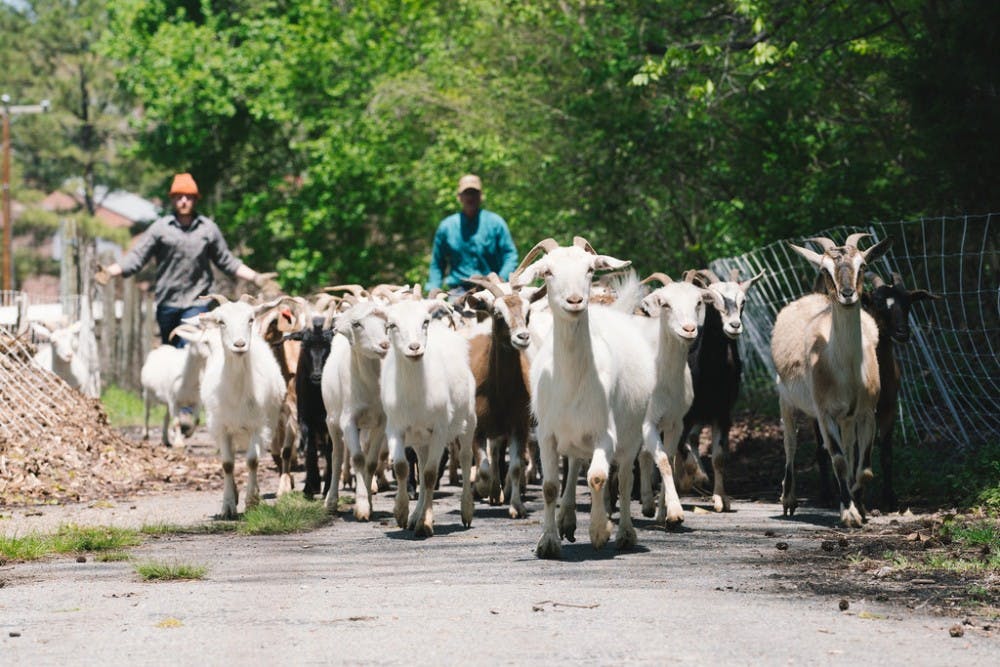Last year, the Office for Sustainability created a six-year plan to improve the integration of sustainability in areas of education, social awareness and campus practices. The plan consists of four goals that expand across three phases.
For the current school year, the Office for Sustainability plans to increase awareness of programs that already exist, such as Rethink Waste, and finish the restoration of Little Westham Creek into the Eco-Corridor by spring 2020.
The Eco-Corridor will provide students with a walking and biking trail to River Road Shopping Center, said Director of Sustainability Rob Andrejewski. Additionally, the corridor will house two outdoor classrooms, part of the goal to integrate sustainability into curriculum. The creation of the space is meant to promote student involvement by providing opportunities to help with invasive species removal, signage and overall upkeep of the garden.
"The stream restoration is critical because it helps the James River not have as much nitrogen, phosphorus and sediment going into it," Andrejewski said. "So it's this really exciting project that will help connect us to the city."
Increased support for programs helping students get involved in environmental classes is another goal for the first phase of the sustainability plan. The Earth Lodge, Maymester and Sophomore Scholars in Residence are a few of the programs already established at UR that the sustainability office plans to connect with the rest of the plan, Andrejewski said.
“I don't think sustainability is currently something that the University of Richmond is as well known for as it should be," said biology and "Geography and the Environment" professor Todd Lookingbill. "I think there are great professors here doing really exciting research at the cutting edge of sustainability."
Lookingbill will be sponsoring a three-week Maymester research program from May 11-31 about environmental challenges in Richmond and in Cape Town and Durban, South Africa. The program is geared toward rising sophomores. The application deadline is Oct. 15.
The second phase of the six-year plan, which is set to go from summer 2020 through spring 2023, delves into bringing expert faculty members together to work toward the larger goals of the plan, such as reducing food waste that goes to the landfill by 50% by 2025.
“A lot of the second phase is convening the people who will be doing the work or setting the policy," Andrejewski said. "But what's in the sustainability plan is to support the creation of this group that will then create standards to push us towards sustainable dining and sustainable procurement."
Spring 2025 is scheduled as the end of the plan. The more ambitious goals that will require fundraising are reserved for this stage: Achieving Sustainability Tracking, Assessment & Rating System platinum, reducing energy use intensity (energy per square foot per year) 40% below the levels emitted by the school in 2009 and preventing 75% percent of the school's waste from going to landfills. The school plans to fulfill 90 initiatives, including these, according to the plan.
In order to accomplish its goal of carbon neutrality by 2050, the school has partnered with the Spotsylvania Solar Energy Center to acquire renewable energy certificates for the amount of energy the school uses. Beside providing certificates, the sustainability office is working with sPower, the farm owner, to create internships and field visits for interested students.
To Andrejewski, the essence of the plan is in making the campus a prototype for conscious living.
Enjoy what you're reading?
Signup for our newsletter
“For me, it can again show people what's possible," Andrejewski said. "I want people to come to the University of Richmond, whether they are visiting students, students who are already here or folks just in the community to be like: 'Oh, wow, that's really neat. I should manage my land for bees as well.'”
GreenUR, an environmentalist group on campus, will play a collaborative role with the implementation of the goals set forth by the sustainability plan, especially in the areas of community events and raising awareness, said the group's president, senior Andre Eanes.
The Office of Sustainability and GreenUR have different approached and roles, but are still able to complement one another, work together and collaborate, Eanes said.
“We each have our strong suits," he said. "We can really amplify that [awareness], and help to make things happen.”
Contact news writer Jackie Llanos Hernandez at jackie.llanoshernandez@richmond.edu.
Support independent student media
You can make a tax-deductible donation by clicking the button below, which takes you to our secure PayPal account. The page is set up to receive contributions in whatever amount you designate. We look forward to using the money we raise to further our mission of providing honest and accurate information to students, faculty, staff, alumni and others in the general public.
Donate Now



